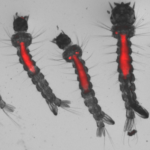Link to Pubmed [PMID] – 27910908
Sci Rep 2016 Dec;6:38230
The larval stages of malaria vector mosquitoes develop in water pools, feeding mostly on microorganisms and environmental detritus. Richness in the nutrient supply to larvae influences the development and metabolism of larvae and adults. Here, we investigated the effects of larval diet on the development, microbiota content and permissiveness to Plasmodium of Anopheles coluzzii. We tested three fish diets often used to rear mosquitoes in the laboratory, including two pelleted diets, Dr. Clarke’s Pool Pellets and Nishikoi Fish Pellets, and one flaked diet, Tetramin Fish-Flakes. Larvae grow and develop faster and produce bigger adults when feeding on both types of pellets compared with flakes. This correlates with a higher microbiota load in pellet-fed larvae, in agreement with the known positive effect of the microbiota on mosquito development. Larval diet also significantly influences the prevalence and intensity of Plasmodium berghei infection in adults, whereby Nishikoi Fish Pellets-fed larvae develop into adults that are highly permissive to parasites and survive longer after infection. This correlates with a lower amount of Enterobacteriaceae in the midgut microbiota. Together, our results shed light on the influence of larval feeding on mosquito development, microbiota and vector competence; they also provide useful data for mosquito rearing.

